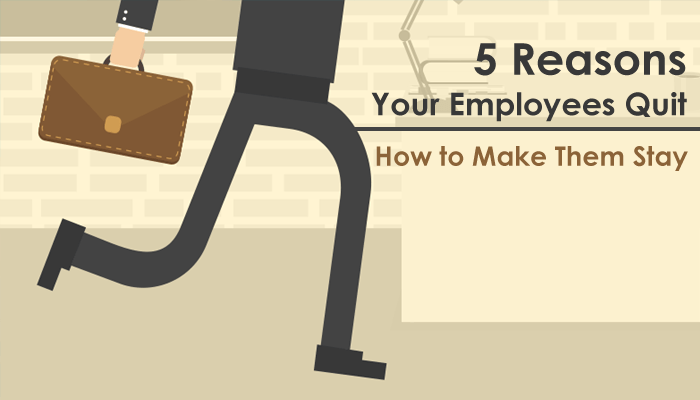No matter how great a leader you are or how big a priority you place on company culture, employee perks, and pay, employees quit. That’s life. There’s no reason to believe you are the cause.
However, if you’re continually losing top talent and feel that you have higher than industry average turnover, you may indeed have a problem.
Why Employees Quit
Employees quit their jobs for a variety of reasons. Some of these you can change, some you can’t, but outside of more pay and better benefits, just about anything within your business is in the realm of possibility, right?
Let’s look at some of the most common reasons employees quit, and what you can do to stop employees quit pushing them out the door.
1. Unclear or impossible expectations.
Over a quarter (28-percent to be exact) of UK employees say that unclear goals and expectations contribute to stress in the workforce as well as wasted time and missed targets.
The best, and most successful companies in the world hire people to do a job as well and outline the processes for those that work with them. These processes lead to a clearer understanding of short and long-term goals. They contribute to an increased feeling of satisfaction in achieving goals too – mostly due to a clear understanding of what they have achieved.
The same can be said for unrealistic expectations.
I saw a job ad the other day that listed pay at $10 an hour and expected the new hire to be a proficient writer as well as someone with audio/video/graphic editing experience and at least a working knowledge of HTML/CSS/Javascript and PHP.
Seriously, what is this company hiring for, and does anyone think that all of these skills are going to be easily held by one person? If so, would someone with a multitude of specialized skills be willing to work for $10 an hour?
2. Workplace gossip.
Workplace gossip kills culture. Some measure of gossip is unavoidable, but malicious gossip and clique workplaces lead to division and coworkers that begin to dislike their workplace.
Danny DeMichele agrees. The CEO of Elevated recently told me, “We go to great lengths to kill workplace gossip. This starts with hiring people who have the capacity to work well within the group rather than seeking to tear down and berate others. Workplace gossip kills otherwise great culture.”
3. They’re not feeling challenged.
An employee should be challenged, but not outrageously overwhelmed. Play to their strengths rather than trying to mold them into the employee that you desire.
If a person doesn’t fit your expectations for the position, you hired the wrong person. So, quit trying to make them into the right person. Find what they excel at and allow them to continue to achieve.
A workplace that doesn’t provide a healthy amount of challenge for an employee quickly becomes boring and mundane. This leads to the dreaded clock-punching employee who is simply there for a paycheck and isn’t at all engaged in what you’re trying to build.
To be a part of something, each employee has to help feel like they are building it. They have to feel challenged and stimulated rather than working on the same tired and monotonous tasks until they get fed up and seek this stimulation elsewhere.
4. No potential for advancement.
Most employees have to feel as if they are moving toward something bigger. As content as we all are in our careers, at some point we want more; it’s human nature. Each employee needs to know that what you’re building will always have a place for them, and as you grow, so do they.
Work on advancement goals together and set aside time a few times a year to evaluate where they are, what they’re happy with and what they wish they could change.
Integrate employees into the building process so they can see the path they’re headed down rather than fading into oblivion in a dead-end position before they ultimately quit for a more lucrative and prestigious position elsewhere.
5. Being undervalued.
There’s no faster way to turn a star hire into a clock puncher than to make him or her feel as if their work is going unnoticed. Once they start to feel undervalued, they start to take on a mentality that they are simply one of many, and their efforts offer no more value than anyone else’s.
This leads to the start of an attitude that sees them phoning in future efforts and sort of dropping off the map while they look for better opportunities.
Even the greatest leaders struggle with some of these things from time to time. The best thing a good leader can do is constantly evaluate themselves and their employees. Start to keep an unofficial pulse of office morale as well as a more formal evaluation process (anonymous is best) where employees can voice their concerns as well as where they see the company headed in the future.
Listen carefully and your employees will often provide the answers to workplace problems that lead to people leaving.



